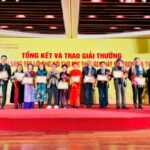The competition received 135 submissions from authors spanning diverse fields and professions. Noteworthy are the entries, or series of entries, exhibiting quality in form, adherence to rules, refined language, sophistication, elegance, conciseness, and the adept application of various classical poetic techniques such as antithesis, parallelism, and allegory, harmonizing with the musical rhythm. The content is rich, with many pieces demonstrating philosophical depth, expressing profound insights into human life, and showcasing the skill and finesse of the authors. Some works exude a classical charm, approaching the quality of predecessors in Sung Poetry. It’s worth noting that the authors producing fundamentally high-quality works are generally relatively young.
On the morning of December 24, 2023, at the Hanoi Museum, the Department of Culture and Sports of Hanoi City organized the concluding ceremony and awarded prizes for the competition of new poetry composition for sung poetry styles in Ca Tru folk music across Hanoi in 2023.
Ca Tru is an ancient art form with various traditional styles, and Sung Poetry is one of its expressive forms. In terms of form, Sung Poetry encompasses different structures such as complete lines, incomplete lines, and couplets, with variations in tone and rhyme scheme. It includes northern-style couplets and southern-style couplets, employing rhyme schemes like parallel verses, separate verses, single rhyme, and double rhyme, with various patterns like single sentence, double sentence, preceding sentence, and following sentence. Creating Sung Poetry is relatively challenging, as it demands a deep understanding of the form, adherence to rules, cultivation of literary virtues, knowledge of traditional poetic techniques, proficiency in using symbolism and metaphor, and a certain level of cultural understanding, including a grasp of musical elements. Only through such knowledge and skills can one produce complete and integral works in terms of form, content, and artistic value, while also meeting the requirements for performance.
The competition received 135 submissions (submitted via postal service, direct submission, or email). Some authors submitted only one piece, while others sent up to 15 works. Notably, the competition attracted participants from various fields and professions, including banking, information technology, business, research, and artistic performance. Many authors not active in cultural and artistic fields showed special interest in Sung Poetry.
The judging panel, consisting of seven members, evaluated the works independently based on assigned codes. After completing the individual assessments, the panel convened a full meeting, announced each member’s evaluation results, and synthesized and reviewed the evaluations to reach a consensus. The selection process was conducted rigorously, with caution and meticulous attention to detail.
According to Assoc. Prof. Dr. Nguyen Binh Dinh, former Director of the Institute of Music, Vietnam National Academy of Music, and Chairman of the Evaluation Council of the competition: The entries selected for prizes mostly comprise complete and incomplete lines, with a few couplets, and no entry lacks completeness. Some have single verses, double verses, and some include northern-style couplets. Quite a few entries fell short in terms of poetic techniques, such as sentence structure and rhyme. These entries tended to have less refined language, lacked craftsmanship, lacked a central theme, and, in general, did not adhere to poetic rules, with shortcomings in vocabulary and theme development. In contrast, many authors produced quality works: well-structured in form, adhering to poetic rules, with refined language, sophistication, elegance, conciseness, and skillful application of various classical poetic techniques such as antithesis, parallelism, and allegory. These works harmonized with the musical rhythm, and their content was rich, with many pieces demonstrating profound philosophical insights into human life, showcasing the skill and finesse of the authors. Some works exuded a classical charm, approaching the quality of predecessors in Sung Poetry. It’s worth noting that authors with fundamentally high-quality works were generally relatively young. This is an encouraging sign. “We hope that from the results of this competition, similar competitions will be launched to increasingly attract the attention and participation of the general public in Ca Tru in general and Sung Poetry in particular. We propose that the Department of Culture and Sports of Hanoi study and organize the recording, filming, publishing, and dissemination of the award-winning works through various media channels, reaching Ca Tru clubs to showcase the performances of these recognized works,” emphasized Assoc. Prof. Dr. Nguyen Binh Dinh.
The organizing committee has awarded 01 First Prize, 02 Second Prizes, 03 Third Prizes, and 10 Consolation Prizes to the authors. The First Prize was bestowed upon the author Pham Van Anh (pen name Truong Phong) for the work “Quang Am Tham Thoat” (First Place). The Second Prizes were awarded to authors Le Tien Dat (pen name Chau Hai Duong) for the work “Cam Thu” (Sensitive Autumn) and Nguyen Quang Duy (pen name Hy Nhan) for the piece “Nho Thang Long” (Part I). The Third Prizes were given to the following authors: Doan Viet Thang (pen name Nguyet Sinh) for the work “Da Vu Doc Chuộc” (Unique Night Dance), Nguyen Minh Dung (pen name Thanh Tam) for “Gap Xuan” (Encountering Spring), and Dam Quang Minh for the piece “Giong Ca Tru Van Diem” (Ca Tru Melody at Van Diem).

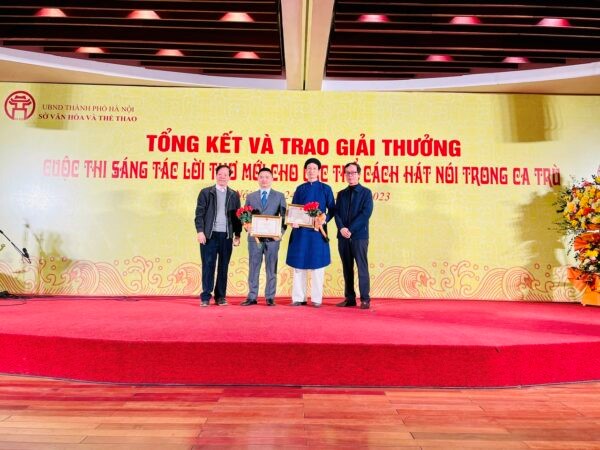
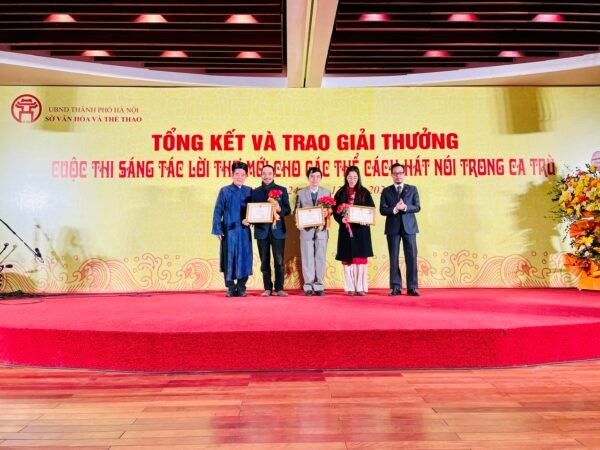
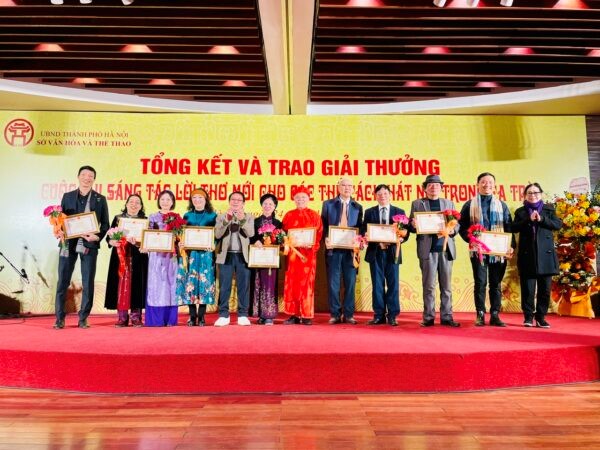
The Organizing Committee awarded the first, second, third and consolation prizes to the authors.
The organizing committee also presented certificates of merit and rewards to two authors: the oldest participant in the competition (95 years old) and the author with multiple high-quality entries who actively responded to the competition.
Following the award ceremony, there was a performance showcasing some prize-winning acts from the competition.
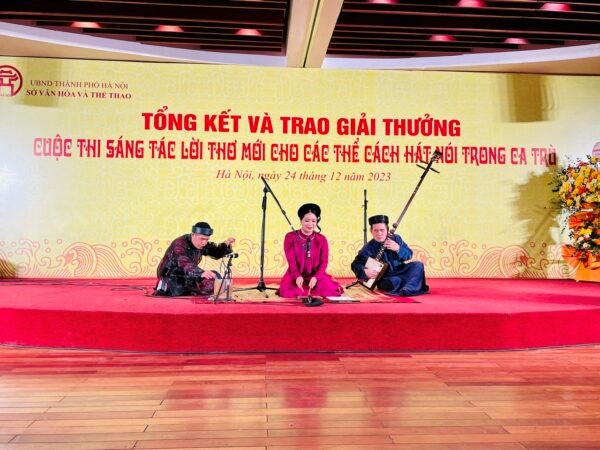
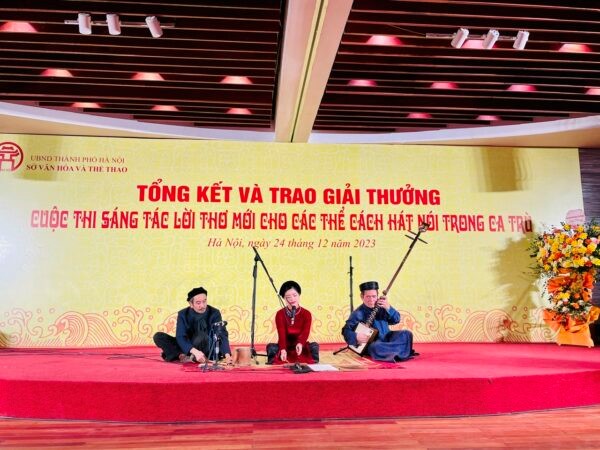

Some award-winning performances in the Competition
Minh Nguyen

